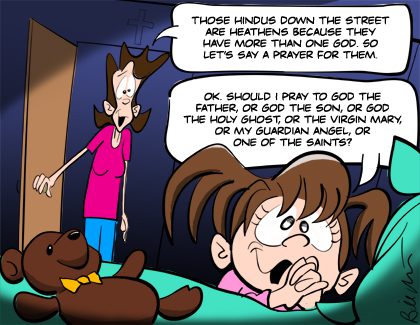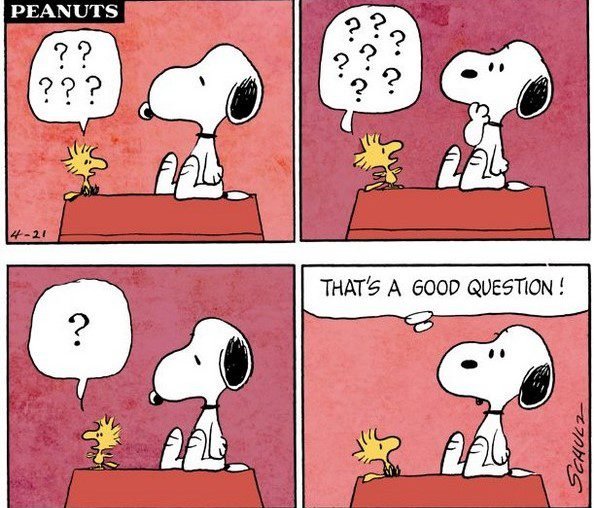
Originally posted in February 2015. Edited, updated, and expanded.
Jason, an Evangelical Christian, asked:
What would cause someone with your Biblical education and years of preaching the Word of God not just claiming to be a Christian but also living it one day decide to not believe and do a 180 and turn your back on it?
While I deal with this question at length in the From Evangelicalism to Atheism series, today I want to give a short, condensed answer to this question.
People like Jason are often perplexed by how it possible for someone with my background and training to one day walk away the ministry and Christianity. Most of the clergy who deconvert do so at a much younger age, often in their 20s and 30s. In my case, I spent fifty years in the Christian church and I pastored Evangelical churches for twenty-five years before I deconverted. When I started going to counseling, my counselor told me that it was quite rare for someone my age and with my experience to walk away from a lifetime of belief and work. It happens, just not very often.
Jason is not alone. A number of my ex-friends, former ministerial colleagues, family members, and former parishioners can’t understand how it is possible that the man they called Preacher or Pastor is now an atheist. Often they cannot or will not believe the reasons I give for my deconversion. Instead, they try to divine some other reason to explain why Bruce Gerencser, the man of God, the pastor, the preacher, their colleague in the ministry, is now an apostate, an enemy of God. “Is there some secret past I am hiding, some secret sin,” they ask themselves? They wonder if I have mental health problems, that I am “unstable.” They rack their brains trying to come up with a plausible explanation, anything but accepting the reasons I give for my deconversion.
Christian Fundamentalism taught me to stand firm on my beliefs and convictions. When I was a pastor, people appreciated and applauded my willingness to resolutely defend my beliefs and convictions. But now that I do the same with atheism, humanism, and liberal politics, they think there must be some other reason I drastically changed my mind and life. Let me be clear, I am the same man, someone who thinks that beliefs matter.
My mother taught me, from my youth up, that it was important to stand up for what you believe. Now, this doesn’t mean that I am not now tolerant of the beliefs of others, because I am. As I get older, I realize that tolerance is an important virtue. Stepping outside of the box in which I spent most of my life, I have found a rich, diverse, and contradictory world that continues to challenge me and force me to be more accepting and tolerant.
When I entered kindergarten I could already read. My book-loving mother taught me to read, and she developed in me an unquenchable thirst for knowledge. This may seem counter-intuitive at first, since I was raised in a Fundamentalist environment that is known for its ignorance. However, by becoming a proficient and avid reader, I had at my disposal countless opportunities to expand my knowledge. Sadly, my quest for knowledge became quite stunted as a pastor because I rarely read books that would conflict with my Evangelical beliefs. However, when I began to have doubts about Christianity and its teachings, my thirst for knowledge kicked into high gear and I began reading books that I once would have considered heretical.
I never made a lot of money pastoring churches. I never had church provided health insurance or a retirement plan. The only benefits I received were a check I got once a week IF the offerings were sufficient to pay me (all too often, they were not). Outside of the time I spent pastoring Community Baptist Church in Elmendorf, Texas, every other church I pastored paid a part-time or poverty-level wage for the full-time work I gave the church. I often worked outside of the church, as did Polly when I pastored Our Father’s House in West Unity, Ohio. I am not pointing a judgmental finger at the churches I pastored. Most of the churches were either small or in poverty-ridden areas. Over the years, I was privileged to pastor many gracious, giving poor people. They gave what they could.
About now you are thinking, what in the world are you talking about, Bruce? I thought this post was about WHY you stopped believing? It is, and what I have written above can be distilled down to these three important statements:
- I was taught to stand firm on my convictions and beliefs
- I was taught to read at an early age and I developed a thirst for knowledge
- I never made much money in the ministry
Since I never made much money in the ministry, there was no economic reason for me to stay in the ministry. I always made more money working outside of the church, so when I decided to leave the ministry, which I did three years before I deconverted, I suffered no economic consequences. In fact, life has gotten much better economically post-Jesus.
Freed from the ministry, my wife and I spent several years visiting over a hundred Christian churches. We were desperately looking for a Christianity that mattered, a Christianity that took seriously the teachings of Jesus. During this time period, I read countless books written by authors from a broad spectrum of Christendom. I read books by authors such as Thomas Merton, Robert Farrar Capon, Henri Nouwen, Wendell Berry, Brian McLaren, Rob Bell, John Shelby Spong, Soren Kierkegaard, and NT Wright. These authors challenged my Evangelical understanding of Christianity and its teachings.
I decided I would go back to the Bible, study it again, and determine what it was I REALLY believed. During this time, I began reading books by authors such as Robert Wright, Elaine Pagels and Bart Ehrman, These three authors, along with several others, attacked the foundation of my Evangelical beliefs: the inerrancy and infallibility of the Bible. Their assault on this foundation brought my Evangelical house tumbling down. I desperately tried to find some semblance of the Christianity I once believed, but I came to realize that my faith was gone.
I tried, for a time, to convince myself that I could find some sort of Christianity that would work for me. Polly and I visited numerous liberal or progressive Christian churches, but I found that these expressions of faith would not do for me. My faith was gone. Later, Polly would come to the same conclusion.
I turned to the Internet to find help. I came upon sites like exchristian.net and Debunking Christianity. I found these sites to be quite helpful as I tried to make sense of what was going on in my life. I began reading the books of authors such as John Loftus, Hector Avalos, Robert M. Price, Daniel Dennett, Christopher Hitchens, Sam Harris, Jerry Coyne and Richard Dawkins.
I read many authors and books besides the ones listed here. I say this to keep someone from saying, but you didn’t read so and so or you didn’t read _______. So, if I had to give one reason WHY I am no longer a Christian today it would be BOOKS. My thirst for knowledge, a thirst I still have today, even though it is greatly hindered by chronic illness and pain, is what drove me to re-investigate the claims of Christianity and the teachings of the Bible. This investigation led me to conclude that the claims of Christianity and the teachings of the Bible could not rationally and intellectually be sustained. Try as I might to hang on to some sort of Christian faith, the slippery slope I found myself on would not let me stand still. Eventually, I found myself saying, I no longer believe in the Christian God. For a time, I was an agnostic, but I got tired of explaining myself, so I took on the atheist moniker, and now no one misunderstands what I believe. (see Dear Family, Friends, and Former Parishioners and Dear Friend)
The hardest decision I ever made in my life was that day in late November of 2008, when I finally admitted to myself, I am no longer a Christian, I no longer believe in the Christian God, I no longer believe the Bible is the Word of God. At that moment, everything I had spent my life believing and doing was gone. In a sense, I had an atheist version of a born-again experience. For the past sixteen years, I have continued to read, study, and write. I am still very much a work in progress. My understanding of religion and its cultural and sociological implications continues to grow. Now that I am free from the constraints of religion, I am free to wander the path of life wherever it may lead. Now that I am free to read what I want, I have focused my attention on history and science. While I continue to read books that are of a religious or atheist nature, I spend less and less time reading these kinds of books. I still read every new book Bart Ehrman publishes, along with the various Christian/atheist/humanist blogs and publications I read, and this is enough to keep me up-to-date with American Christianity and American atheism/humanism.
I hope this post adequately answers the question of WHY I stopped believing.
Bruce Gerencser, 68, lives in rural Northwest Ohio with his wife of 47 years. He and his wife have six grown children and sixteen grandchildren. Bruce pastored Evangelical churches for twenty-five years in Ohio, Texas, and Michigan. Bruce left the ministry in 2005, and in 2008 he left Christianity. Bruce is now a humanist and an atheist.
Your comments are welcome and appreciated. All first-time comments are moderated. Please read the commenting rules before commenting.
You can email Bruce via the Contact Form.

 …before Israelite religion denied the existence of other Gods than Yahweh, it went through a phase of granting their existence but condemning their worship (by Israelites, at least; if the Moabites wanted to worship Chemosh, that was their business). In technical terms, Israelite religion reached monotheism only after a period of “monolatry” — exclusive devotion to one god without denying the existence of others.
…before Israelite religion denied the existence of other Gods than Yahweh, it went through a phase of granting their existence but condemning their worship (by Israelites, at least; if the Moabites wanted to worship Chemosh, that was their business). In technical terms, Israelite religion reached monotheism only after a period of “monolatry” — exclusive devotion to one god without denying the existence of others.